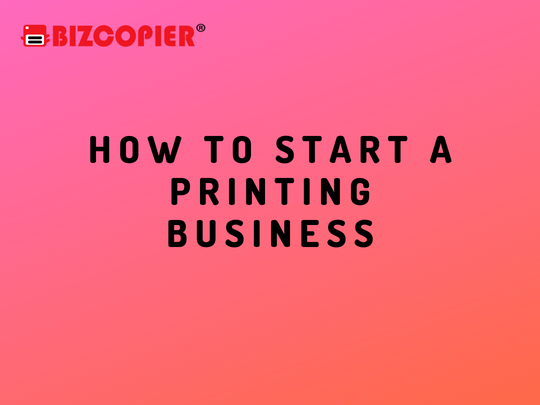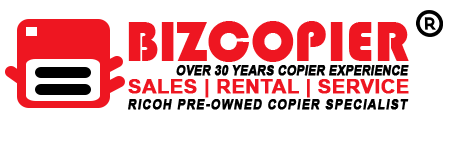How to Start a Printing Business

According to the U.S. Bureau of Labor Statistics, the majority of printing businesses employ fewer than ten people. As more printing companies use digital printing equipment, fewer skilled technicians will be required to operate it. Modern digital printing equipment is smaller and more affordable than ever before, and almost anyone with capital can buy and operate it, even from a home office.
Part 1- Finding a printing
1. Find a niche within the printing industry. The most successful printing entrepreneurs start a printing business by finding a niche in a specialized area, such as digital printing. Instead of trying to be all things to all people, success is more attainable by targeting a need and fulfilling it.
- One of the best examples of this strategy can be seen by the success of franchise sign printing businesses, which target budget-minded business owners who only need occasional signs and banners, which can be spotty (inconsistent demand) or loaded with competition. They do not attempt to offer anything but quick-turnaround signs and leave brochures and envelope printing to traditional offset printing businesses.
2.Familiarize yourself with the business standards. Realize that the niche for color printing and the better quality grade of printing may be in a certain number of dots per inch (DPI), which can be very demanding and tricky to match.
3. Be careful with your words. Remember, as a business owner, you will be responsible for the timely completion of jobs to your customer’s satisfaction. Caution: Any verbal or written agreement like You [the printer] know what looks right, so you can okay the proofs for color and quality is loaded with the danger of customer rejecting the finished product. For example, they may require:
- Product match, excellent quality – very precise color, hue, and tone for high end products.
- Color match, excellent quality – usually precise Process Matching System (PMS Colors) by screen values (tones created by dot sizes) of the 4 process colors (cyan, magenta, process yellow, and black).
- Or just pleasing color, of medium quality – which is not so precisely matched. Caution: that means pleasing to the customer, not to you.
- Commercial quality printing is probably a cut above desktop publishing, done in your-office (above typical office printer, copier, or duplicator quality). It requires sharp line art and text – fineness of line work does not vary from page to page, screen color or halftone detail is consistent.
- Any choice of printing process (or brand of paper) shown on a quote to your customer is for them to choose. No, you can not substitute a more profitable method or material. Unless they agree in writing to a change, they can demand that it be redone at your expense — if you did not follow written specifications precisely.
Part 2 :Determining What Equipment You’ll Need
1.Research the competition and their equipment. Once you find out who your target market is, research the printing businesses who are currently attempting to fulfill the needs of this audience. Visit these printing businesses’ websites and learn all you can about them to find out what services they are lacking. Draft plans to start your printing business by researching ways you can offer those badly-needed services and improve upon the printing business as a whole within your specific niche.
2.Investigate the printing equipment available from manufacturers. Start looking for your own printing equipment once you’ve determined what your competitors are using in their printing businesses. You’ll need to find high-quality, yet reasonably priced, equipment for your niche. The wrong equipment can either make or break your company. You’ll need a desktop computer, design software, and a high-quality digital printer capable of handling jobs up to 11in x 17in.
3. Research and obtain any necessary approval or documentation. This includes any licenses, certifications, permits such as a state sales tax permit (in the USA, under the United States Constitution guarantee of “freedom of the press” — printers, printing companies, writers, editors and publishers can not be required to be licensed to be able to perform such work or services). You will need fire department certificates, fire extinguishers and other safety equipment, safety procedures, safety rated chemicals, zoning, building use and occupancy permits and other items required for your specific operating location. Even if you start a home-based printing business, you will likely need some kind of permit or license from your particular national, state and local governments. Call or meet with your local economic development agency to find out where to go next.
- You should familiarize yourself with Occupational Safety and Health Act (OSHA) requirements, including their and other agencies such as Equal Employment Opportunity Commission (EEOC) “postings” (required posters about safety and employment opportunity, etc.).
- Record keeping, tax withholding, reporting, and paying taxes and social security quarterly for employees (including part-time) are necessary.
- If you only use independent, outside printing contractors to do occasional printing that you cannot do personally, then you could be a “printing broker” (non-affiliated, wholesaler) and not have employees.
- Quarterly estimates of income, record keeping, reporting of actual proceeds, and paying your personal proprietorship or corporate (limited liability corporation [LLC]) taxes and social security for yourself is your responsibility to learn and complete each year.
4. Secure funding. Starting a new printing business will take several thousand dollars in capital. If you cannot finance this equipment on your own, contact your chamber of commerce to learn who can help you apply for a small business loan.
- After you become established and have enough credit and show volume and potential, you might be able to lease equipment, which can bring flexibility, but leases may have penalties and balloon notes, etc. to return or to keep the item, respectively.
Part 3 : Offering Profitable Services
1. Choose a business location. To start a profitable printing business, you’ll need to choose a location that works for you. Look for a place that is within your budget and that is easily accessible so customers will be able to find you with ease. You don’t want anything to deter you from getting clients, and choosing a good location is a big part of that.
- You can look at locations online via realtor websites or hire a realtor to help you find the perfect location for your new printing business.
2. Turn printed items into products by creating a menu of what you offer. When it comes to printing, most business owners don’t know exactly what they need. A food manufacturer might think they need a traditional vinyl banner for an event but they don’t understand the pitfalls of using it in various scenarios. What they really need is a portable tabletop sign that can be utilized at events, sales meetings, and other public awareness activities. The more your customers understand what a product can do, the happier they will be with the finished product.
3. Offer value-added services. These are items that enhance your finished pieces within your niche, such as brochure holders. Printed brochures need something that can display them properly. If you are able to sell brochure holders along with your print job, your customer just might thank you for saving them the effort of looking for a display by purchasing one.
4. Promote your new print shop. Once you start a digital printing business, you need to get the word out to bring in sales. Join your local chamber of commerce, sponsor community events, and advertise in the local newspaper. Don’t forget to promote yourself online by building an effective website, participating in industry forum discussions, and taking steps to distinguish yourself from local and worldwide competition.

*Other Model Available
RICOH MPC3503/ MPC5503 | RICOH MPC3504/ MPC5504
CONTACT US: 03-3341 6296 | 018-788 6296 | 018-228 6296





Recent Comments